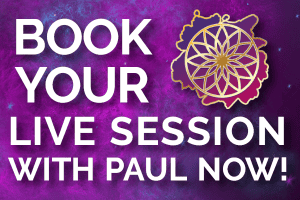
It’s time to reboot with this awesome ritual. A Shutterstock Licensed Image.
I’m fascinated by White-Lighters. Who are the White-Lighters? These are the folks breathing white light through their navel with the hope that their world will change without any additional effort. They write down their needs and desires and say, “Since I have written and spoke these things, they will all appear!”
Unfortunately, reality doesn’t work that way. It’s true that thoughts and intentions are powerful. They help us form our action plans, relationships, and boundaries. They set the tone we need to move forward on a path. But if we’d like something to actually occur, ya know, like in a physical reality that we are participating in, we have to invest quite a bit of action into an event before it manifests. Matter is quite a complex notion, especially if you want to move it around or make it do something that’s a deviation from its current path.
Making changes to our lives can be complicated. We might want to say goodbye to a friend who continually hurts or disrespects us, but that friend is connected to 27 other people we love. How then do we move through space and time and fine-tune our experience without creating absolute social havoc?
How do we disrupt our old ways and create lasting change?
To effect lasting change in our lives, it’s important that we can access our feelings, express ourselves, clean house, and establish changes in our behavior. Ritualizing the changes we desire can produce a lot of emotions which results in an up-leveling of our wisdom. Without emotions, there’s no wisdom, and without wisdom, it’s difficult to make better decisions.
I cried my eyes out yesterday saying goodbye to someone I had said goodbye to long ago. The problem was that when I exited that relationship, I didn’t fully emote the change. I may have been in a state of shock.
Conversely, when I’ve ritualized the changes I’ve wanted, the emotions come, and then I’m clearer and more resolute. And because I’ve begun to release emotions, when I make the change, it’s a full-bodied, resolute, and complete experience.
What does it mean to ritualize a desired change?

A ritual is a physical activity involving clear intentions, words, symbolic gestures, and objects that we find to have meaning in our lives, the unique coordination of which helps us establish a greater level of peace or a change around a specific reality. In short, a ritual is a personal, physicalized prayer.
My favorite ritual for letting go of the past, changing behavior, and inviting a new paradigm for life is called, The Changing the Book of Life. I learned the ritual from a Native American elder who had taken me under his wing.
With a gallon of water, a blanket, and a list of things I wanted to pray about, I hiked into the Pecos wilderness, veering off the main path for around 10 miles. After a full day of hiking at a great pace, I was nestled deep in the real wilderness (not the wilderness marked by paths, signs, and toilets). I climbed atop a steep hill above the tree line and I sat in the lotus position and meditated.
It was a super hot day in August so I took off all my clothes and drank some water. I felt peaceful and resolved in what I was about to do. A mountain lion walked nearby and climbed further up the hill. He sat behind me and watched me for the duration of my ritual.
There were no birds at this elevation, but a few tiger moths floated gently around me. I took out a piece of paper titled, “Changing the Book of Life Ritual,” which had a list of instructions, along with my list of all sorts of things that I wanted the universe to shed some light on.
The ritual asks that we choose a deity. I chose a power-quad of Jesus, Amma (Amma.org), Buddha, and a Tree. I imagined the four of these superpowers working on my behalf throughout the entire ritual.
The instructions stated that I was to imagine each challenge that I wanted to be changed in my life and ask the deities to “Change the Book of Life” for all time.
Here’s the way it works:
-
Sit quietly and make a list of the things in your life that you want to release. This includes people, places, events, experiences, and ideas.
-
Head into the woods alone so that you can connect with nature. Find a peaceful place to perform your ritual.
-
As you sit quietly, invite all of your guides and diety to join you.
-
Imagine that you can see your deity (or imagine an expansive universe) in front of you, near you, or in the sky around you.
-
Imagine the challenges that you want to release and speak them aloud.
-
Tell the universe or your deity that you want back all the gifts, talents, and attributes that you gave to this person or experience.
-
Tell the universe that you are giving back all the gifts, talents, and attributes that you received from this person or experience.
-
Ask the deity or universe to help the people involved in the challenge. Pray that neither you nor the other person (or peoples) experiences no lost love in the change you are requesting.
-
Ask that all dangling threads of need, hope, and desire are fulfilled and nurtured in every way by the limitless universe. In this way, there is no loss, even though you are asking that something be deleted from your eternal life records.
-
Tell the deity or universe that you want this change to happen immediately, right now, and that you want the “book of life” to be changed for all time.
I thought I had a handful of things I wanted to change, but the more I got into it, I was releasing more and more. I was going far beyond my original list.
I thought this ritual was going to take a couple of hours and then I’d be off hiking, but I let go of 40 people and events, and it took seven hours to complete.
Throughout these seven hours, I cried, laughed, sobbed heavily, pounded the earth in anger, freaked out, pissed myself, had anxiety, shouted out my pain, and completely exhausted every level of my being in every way. It was a relatively insane experience, but WOWOWOW! It was powerful.
As I looked out across the treetops, seeing this beautiful sunset, it was the clearest sky I had ever seen. I could see eternity. I peeked over my shoulder and saw the mountain lion was still resting nearby.
I felt deeply grateful for the experience of releasing so many things, so I bowed my head and thanked the universe for this changing of the book of life.
I thanked creation, knowing that my gifts, talents, and attributes would be returned to me. I knew I would feel more whole.
As I lifted my head with love in my heart, 20 feet in front of me, just off the edge of the cliff appeared 40 beautiful, boisterous, singing birds.
This was the universe reflecting back to me all that I had given away in my life. I felt heard and loved. I was so deeply moved that I sobbed for an hour in gratitude.
The Changing of the Book of Life Ritual was extremely powerful for me. There has been nothing even remotely similar to this experience in my life. It was beyond life-changing. I slept soundly atop the rocks that night with my friend the mountain lion nearby.
The ritual was a profound experience and it worked according to its promise. I released things I never thought were possible. Everything was lighter after that day. My life felt realigned and focused. My heart was no longer cloudy and my relationship-tree was cleansed and simplified. I was renewed in every way.
Days later, I had several unusual voicemails from a few people I had released. They must have felt something. I know I sure did.













